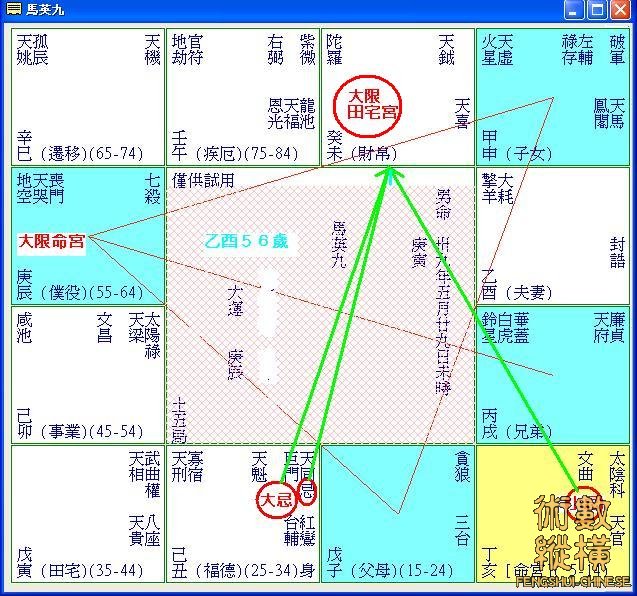|
|
樓主 |
發表於 2012-11-18 08:50:15
|
顯示全部樓層
馬今年內心一定吶喊〝它?馬〞的你們幹嘛一直數落我?
年初勝選之後,應了馬名言,只要高興一天就好。接下去沒有一件事令人民滿意,動輒得咎,現在竟然另類台灣之光,獲得國際認證,大大出風頭...。
大限流年重疊,流年武曲化忌沖流年官祿,可以理解馬的工作表現。
以星垣論技法,大限流年雙忌分別沖擊大限流年的命遷、子田、奴僕、福德。
星君主權,不留情的話,也只能接受。
....................................................................................................................
笨拙說 經濟學人網站熱議…擠下中共十八大
【聯合報╱布魯塞爾記者蕭白雪?17日電】
2012.11.18 03:52 am
英國「經濟學人」雜誌有關馬英九總統的報導,不只在國內引起熱烈迴響,在「經濟學人」網站上,今天更高居熱門討論第一名,不但打敗中共十八大的新聞報導,連「經濟學人」花了十四頁做的法國經濟問題都排在馬英九後面。
截至英國十七日下午三時許,「經濟學人」網站上已有超過三百則對該篇報導的回應,中、英文皆有,支持與質疑該篇報導的聲浪都有,除了有台灣藍、綠論戰常見觀點外,還有不少海外僑胞加入討論行列。
支持「經濟學人」者認為,該篇報導的內容再正確不過了,還有人加碼批評,指馬不但愚蠢無能,六三三跳票、更有人說他還有冷血未被提及。但也有幫馬英九講話的網友,指馬是有高度理想性的政治人物,但隨即引來多人留言,有人諷刺這是今年最大笑話。
有在美國的台灣人留言說,該報導沒常識,台灣歷經李登輝和扁政府的貪汙,內鬥摧毀了教育、司法等制度,但在許多國家中,台灣目前的情況並沒那麼糟。
也有網友質疑英國的雜誌批評他國總統很奇怪,更指英國現任首相卡麥隆不是更糟嗎?
「經濟學人」本期報導引起的爭議不少,不只對馬英九的評論引爆台灣熱烈討論,封面故事指法國將成歐洲心臟定時炸彈的內容,同樣引發法國政府及不少法國人不滿,多位政府官員都在媒體上駁斥反擊。
此外,本期也有不少篇幅介紹中共十八大後的政治局勢,以及新領導人習近平,只是,大概沒人想到,評論台灣馬總統的報導,引起的迴響竟贏過中共和法國。
全文網址: 笨拙說 經濟學人網站熱議…擠下中共十八大 | 經濟學人批評馬 | 國內要聞 | 聯合新聞網
..............................................................................................................................................
※延伸閱讀?
?經濟學人?Ma the bumbler
http://www.economist.com/news/asia/21566657-former-heart-throb-loses-his-shine-ma-bumbler
Taiwan politics
Ma the bumbler
A former heart-throb loses his shine
Nov 17th 2012 | TAIPEI | from the print edition
WHEN he was first elected in 2008, Taiwan’s president, Ma Ying-jeou, offered Taiwanese high hopes that the island’s economy would open a new chapter. He promised ground-breaking agreements with China to help end Taiwan’s growing economic marginalisation. At the time, Mr Ma’s image was of a clean technocrat able to rise above the cronyism and infighting of his party, the Kuomintang (KMT). He was a welcome contrast to his fiery and pro-independence predecessor, Chen Shui-bian, now in jail for corruption.
Five years on, and despite being handily re-elected ten months ago, much has changed. In particular, popular satisfaction with Mr Ma has plummeted, to a record low of 13%, according to the TVBS Poll Centre. The country appears to agree on one thing: Mr Ma is an ineffectual bumbler.
Ordinary people do not find their livelihoods improving. Salaries have stagnated for a decade. The most visible impact of more open ties with China, which include a free-trade agreement, has been property speculation in anticipation of a flood of mainland money. Housing in former working-class areas on the edge of Taipei, the capital, now costs up to 40 times the average annual wage of $15,400. The number of families below the poverty line has leapt. Labour activists have taken to pelting the presidential office with eggs.
Exports account for 70% of GDP. So some of Taiwan’s problems are down to the dismal state of rich-world economies. Yet Mr Ma’s leadership is also to blame. He has failed to paint a more hopeful future, with sometimes hard measures needed now. Worse, he frequently tweaks policies in response to opposition or media criticism. It suggests indecisiveness.
Public anger first arose in June, when Mr Ma raised the price of government-subsidised electricity. Few Taiwanese understood why, even though Taiwan’s state-owned power company loses billions. In the face of public outrage, Mr Ma postponed a second round of electricity price rises scheduled for December. They will now take place later next year.
People are also worried that a national pension scheme is on course for bankruptcy in less than two decades. Yet Mr Ma cannot bring himself to raise premiums sharply, because of the temporary unpopularity it risks. When Mr Ma does try to appeal to Taiwanese who make up the island’s broad political centre, it often backfires with his party’s core supporters. Following public grumbles that retired civil servants, teachers and ex-servicemen were a privileged group, the cabinet announced plans to cut more than $300m in year-end bonuses, affecting around 381,000. The trouble was, veterans are among the KMT’s most fervent backers. Now some threaten to take to the streets in protest and deprive the KMT of their votes until the plan is scrapped. Meanwhile, Mr Ma’s clean image has been sullied by the indictment of the cabinet secretary-general for graft.
Cracks are starting to grow in the KMT facade. Recently Sean Lien, a prominent politician, criticised Mr Ma’s economic policies, saying that any politician in office during this time of sluggish growth was at best a “master of a beggar clan”—implying a country of paupers.
But the next election is four years away, and presidential hopefuls will not try to oust or even outshine Mr Ma anytime soon. After all, they will not want to take responsibility for the country’s economic problems. Nothing suggests Mr Ma’s main policies will change (or that they should), but his credibility is draining by the day.
from the print edition | Asia |
-

|